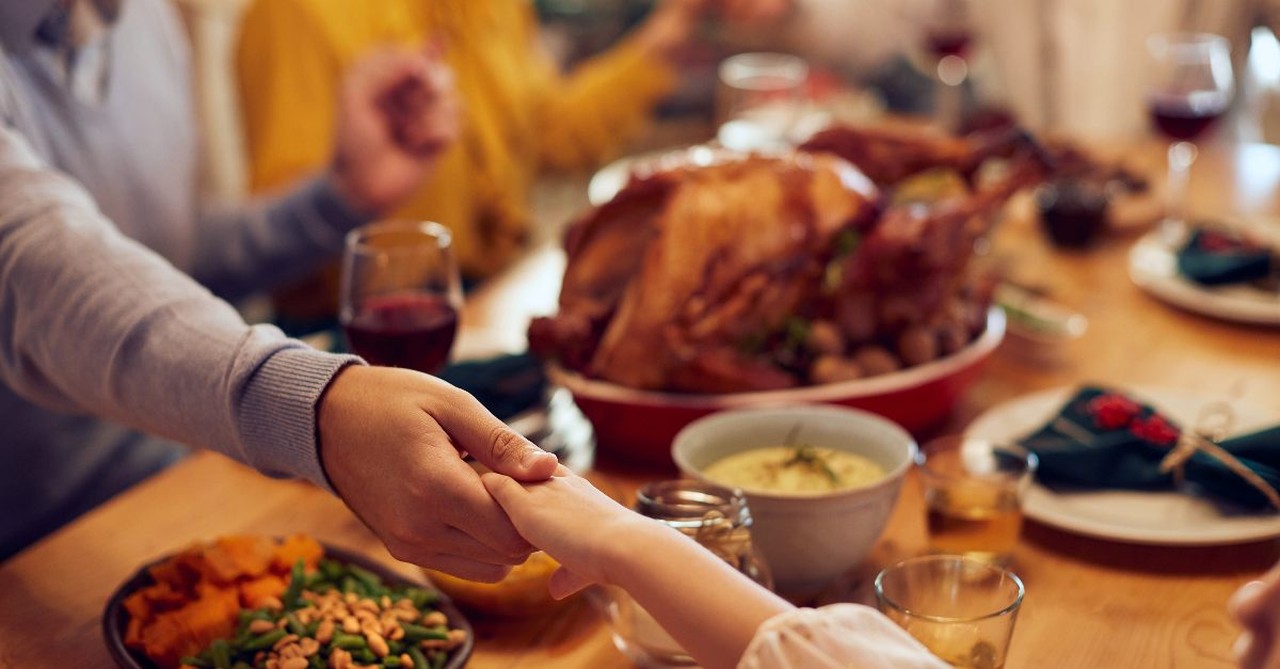5 Ways You Can Support Those Who Are Grieving This Thanksgiving

Whether we want to believe it or not, 100% of humans will experience some sort of loss in their lifetime. From the loss of a friend, a spouse, a parent, or even a pet, no one can escape the heartache that follows a loss. Unfortunately, loss is unavoidable for us all and proves that we share this common denominator that we all grieve!
Even though grief is universal, each person's experience is different and personal to their story. If you have a friend experiencing a season of grief this Thanksgiving, you may be worried you won't be able to support them, especially if you have not yet experienced a loss.
As you gather around the table this Thanksgiving, here are five meaningful ways to show support to those struggling with loss.
Photo Credit: ©Unsplash/Jacob Postuma
1. Pray for Their Healing

1. Pray for Their Healing
SLIDE 1 OF 5
There is power in prayer! Prayer can be a powerful way to bring comfort to someone who is grieving. Pray for their peace, comfort, and healing, especially if this is their first holiday without their lost loved one. You could pray in a group by starting a prayer chain in your life group or devote your daily devotionals leading up to Thanksgiving to your grieving friend or loved one. Make sure you are being sensitive to their needs and where they are in their grief journey. If they seem open to talking about their loss, let them know you are praying for them and even ask if there is anything specific they'd like you to pray for. Some may even appreciate you asking if you can pray together.
Check out our list of Best Prayers for Strength in Difficult Times.
Photo Credit: ©GettyImages/tommaso79
2. Offer Thanksgiving Prep Help

2. Offer Thanksgiving Prep Help
SLIDE 2 OF 5
As many of us know, a lot of prep goes into a big Thanksgiving meal, like prepping the menu, stocking up on groceries days prior, and setting the table or rearranging the house to fit all your guests. Everyday tasks can already be an adjustment for someone newly grieving. If this is a widower/widow's first time making a Thanksgiving meal without his/her spouse, it can be overwhelming to still have to host a holiday without the help of their partner. If you want to be of help, try offering to help pick up groceries, assist with meal prep, or bake an extra pie on days leading up to Thanksgiving. Doing so can be beyond helpful to a grieving widower/widow. Unfortunately, we all experience loss at some point in our lives, and you never know when someone will need to be there for you to return the favor.
Photo Credit: ©iStock/Getty Images Plus/mixetto
3. Invite Them to Share a Meal

3. Invite Them to Share a Meal
SLIDE 3 OF 5
If this is someone grieving for the first Thanksgiving, it may be difficult for them to spend the holiday entirely alone. Simply offering them an invitation to join your family's Thanksgiving meal or even a Friendsgiving meal can lift their spirits. This small gesture can provide them with a sense of belonging and comfort during this difficult season.
Remember, every grief journey is different, so be mindful that if they turn down the offer they may just not be ready for large crowds or celebrations just yet. You can also offer to bring a meal to their home if they prefer a quiet, at-home setting. Allow them to choose what feels right and best for them, reassuring them that the invitation is always there! Accept or decline, this act shows them they are not alone in their grief journey and support will always be available when needed.
Photo Credit:©iStock/Getty Images Plus/Drazen Zigic
4. Avoid Talking about a Lost Loved One Unless Initiated

4. Avoid Talking about a Lost Loved One Unless Initiated
SLIDE 4 OF 5
One thing that many people try to do is draw attention to a loss – this can make things uncomfortable. It's best to allow whoever is grieving to lead or start any conversations about their lost loved one. They may find solace in sharing memories and talking about their grief, or they may not bring it up at all, especially during a holiday gathering, which tends to be an extra sensitive time. If they do start talking about their loved one, simply listen attentively and offer your support without steering the conversation. Sometimes, the best thing to say is nothing; being present allows the grieving individual to express their emotions.
Note that grieving emotions come in high and low waves. Some days, they may feel very joyful when talking about their lost loved one, while other days, it may be more painful to speak of them. Keep that in mind and try to meet them where they are in their grieving process.
Photo Credit: ©Getty Images/The Good Brigade
5. Offer Support at Counseling Groups

5. Offer Support at Counseling Groups
SLIDE 5 OF 5
Some who are grieving may be more open to talking about their journey, while others prefer to keep their feelings private. If you have a grieving friend or family member who is open to it, you can suggest joining them for a grief support group or counseling session. The holidays can be an extra hard time, and having a safe space to talk through how a new season makes someone grieving feel is incredibly therapeutic.
Being surrounded by others who are also going through a loss allows individuals to feel like they are in a space where they can share their feelings without judgment or burdening friends and family. Offering to go with them or even helping to research support groups in the area can be an act of kindness that shows you care about their emotional well-being and are there to support them.
Counseling and support groups may not be for everyone, so if they are not ready or comfortable with the idea of joining one, be respectful of their decline and make it clear you’re there to support them in whatever way they need.
Photo Credit: ©iStock/Getty Images Plus/fizkes
Related Article: 6 Ways You Can Work through Grief This Thanksgiving
Originally published October 04, 2024.









